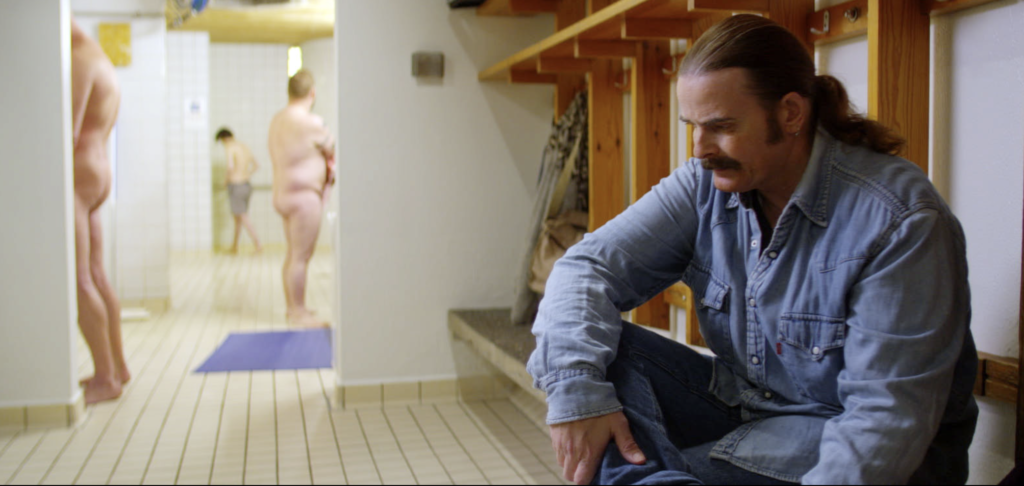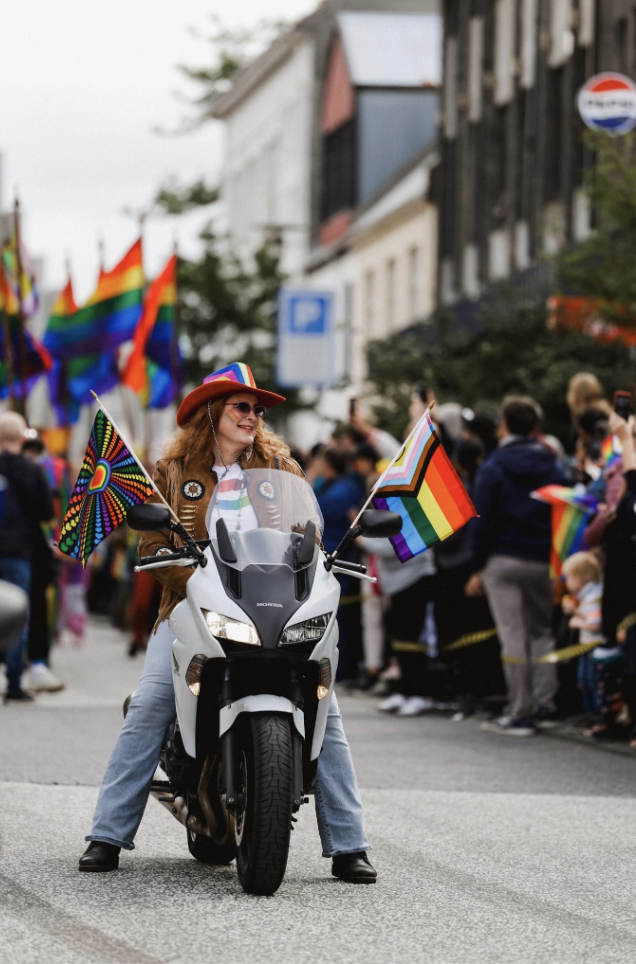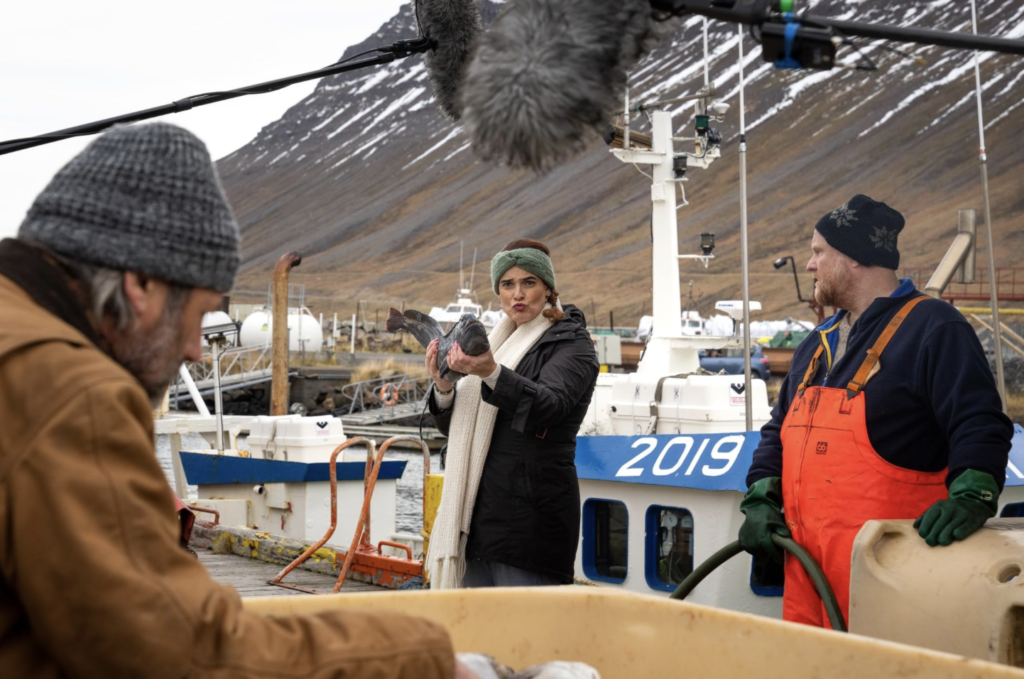In an interview with GayIceland’s Magdalena Lukasiak, Arna Magnea Danks, an actress, fight director, teacher and trans rights advocate, delves into her journey of self-discovery, her role in the groundbreaking film Odd Fish, opening in cinemas in Iceland this week and the challenges and triumphs of living authentically as a trans woman in Iceland.

GayIceland: Have you seen the whole movie? If so, what did it feel like?
“I haven’t seen the movie, just the trailer and a few playbacks on set. I must admit that I’m both nervous and excited about seeing the film, but also about the response to it. This is my biggest role so far, and it’s also the only Icelandic film that tells the story of a trans woman, played by a trans actress.“
This is my biggest role so far, and it’s also the only Icelandic film that tells the story of a trans woman, played by a trans actress.
GayIceland: Tell us about the story, what the film is about.
“The movie is about two lifelong friends who have always supported each other and run a seafood restaurant together in Ísafjörður. They’ve only been able to keep it open for six months a year because there haven’t been any tourists during the winter months. As it starts to look like they can keep the restaurant open year-round, one of them comes out as a trans woman, which has a massive impact on both their lives and their friendship. The film really explores how they navigate and deal with the changes and turbulences of life.“
GayIceland: What’s the story behind the title, “Odd Fish“?
“The director, Snævar Sölvi Sölvason, was looking for a catchy title for the film in English. After talking with me and others, he suggested Odd Fish and I felt it was fitting, because I’ve always felt different from others, being autistic and trans, and the character Björn/Birna also feels closed off and a bit odd. Also given the seafood restaurant setting, Odd Fish seemed fitting.“
GayIceland: Can you tell us a bit about your character in the movie?
“Björn/Birna is initially presented as Björn, a distant and troubled person. Birna has only one close friend, Hjalti, played by Björn Jörundur Friðbjörnsson, whom she has relied on throughout her life. After her father’s death early in the film, Birna realizes she must come out as her true self or risk losing her will to live. The film shows her journey of embracing her identity, finding joy in cooking, and discovering a newfound passion for life once she is free from the constraints of pretending to be someone she’s not.“
GayIceland: We know you studied acting but worked usually on the other side of the camera. What inspired you to step behind?
“If I understand the question correctly, you’re asking why I became a fight director. At drama school, I excelled in stage combat, and fencing became a solace for me during difficult times. Deep down, I think on some level I always knew I was pretending to be male, which made acting exhausting because I was already playing a role in real life. The roles I got didn’t resonate with my essence, and I lost the joy in acting until after I came out.“

I must admit that I’m both nervous and excited about seeing the film, but also about the response to it.
GayIceland: What was the experience like during filming?
“The director is brilliant in so many ways. For me, it was his kindness and willingness to learn about the lived trans experience and adapt whenever needed. Ólafía Hrönn once summed him up perfectly: a “total sweetheart“. But he also has the technical skills—an eye for detail, a sense for light and sound, and the ability to capture the right atmosphere in fleeting moments.
Björn Jörundur, who plays Hjalti, was my rock throughout the entire production. He lightened difficult situations with his charisma, humor, and intelligence. Helgi Björns, Ólafía Hrönn, Vigdís Hafliðadóttir, and Sara Dögg Ásgeirsdóttir were all fantastic to work with, and their love and respect for the project are evident in the film. Vigdís and Ólafía are two of the funniest people I have ever met, but also the kindest.“
GayIceland: Were there any memorable moments on set, either funny moments or challenging?
“There were quite a few, but some things should stay behind on set. However, I’ll always remember one day when I was feeling particularly low and struggling with my own demons – I have C-PTSD. Sara Dögg noticed I wasn’t in the right zone and helped me through it. She showed not only her incredible talent as an actress but also her generous, wise, and kind heart.“
GayIceland: Do you see any similarities between yourself and the character you play in the movie?
“There are similarities because we are both trans women who knew we were female from early on but struggled with coming out and didn’t manage it until later in life. We also love to cook and eat seafood, especially fish, and love our friends wholeheartedly. But we are completely different people with very different backgrounds. In many ways, Birna was the fortunate one, though I have something she never had but desired greatly—children.“

The first time I came out as a girl, I was four years old, running to my mom and saying, “Mom! I’m not in the mirror!
GayIceland: On that note, when did you come out, if we may ask, and what motivated that decision?
“The first time I came out as a girl, I was four years old, running to my mom and saying, “Mom! I’m not in the mirror!“ I hated being forced to live as a boy, and later, as a man, it caused me immense mental suffering. I discovered the word “trans“ at 32 and quickly came out to close friends while living in London in 2003. However, I de-transitioned a couple of years later, just before becoming a parent for the first time. For years, I convinced myself that I wasn’t trans, just mentally ill. Eventually, I couldn’t live the lie anymore. The only choice left was to live authentically or die. I fully came out in March 2018 at 47 and started HRT a few months later.“
GayIceland: How did your private and professional life change after coming out?
“Initially, I stopped hearing from directors about fight directing work, and some directors I had worked with never contacted me again. I didn’t get any fight directing or stage combat teaching work, except at the Icelandic Film School, for almost three years after coming out. COVID-19 played a part in that too. On the plus side, I found joy in acting again and a purpose in LGBTQIA+ activism and education.
My private life changed drastically. I lost friends and family members, and I got divorced. My ex-wife and I were together for 10 years, married for seven, and we have always handled everything regarding our two sons together and still do. We live in the same neighborhood and are good friends today. Our sons call her “mom“ and me “Arna mom“. My biological family is quite broken, and I only see them for major events like funerals. But I learned who my true friends were and gained new ones within the queer community.“
GayIceland: How did your friends and family react, especially in light of your ex-wife’s response?
“I think I’ve already answered this. My ex-wife is an amazing, brilliant, and wonderful person, and I owe a lot to her. I wouldn’t be where I am today without her support and friendship. My sisters and brothers didn’t handle it well at first, and I’m not sure how they feel now. We hardly see or talk to each other. My mother died in January 2004, and I stopped talking to my father a long time ago.“
GayIceland: Have you experienced transphobia in Iceland?
“Yes, unfortunately. I’ve been visible and vocal as an advocate for human rights, including trans rights, which has brought me some hate. I’ve been told in various ways that I will be permanently silenced, that I am disgusting, vile, and should “eat a bullet.” I’ve been called all sorts of names. I once contacted the police about it, but they said they couldn’t do anything unless the threats became more personal and in person. A lawyer is still looking into those threats, but it’s unclear if there’s enough legal ground for a case since the threats weren’t direct enough.“

My hope is that this film will help people see that we are neither laughable nor something to fear, but in fact, so completely and utterly human.
GayIceland: What do you think needs to be done to support trans people here in Iceland?
“Firstly, the law against hate speech needs to be clear enough so that haters can be held accountable, regardless of the wording of their threats. For example, someone telling me I “should” eat a bullet wasn’t direct enough for legal action, but it’s still a dangerous and harmful statement. Anti-trans, TERF propaganda must also be held accountable, especially when false information is spread by people in public positions like teachers, parliament members, and health professionals.“
GayIceland: Do you think this movie may change something in the general public’s understanding of trans matters?
“I truly hope so. I believe this film will open many eyes and make people realize how human we are. The main problem today is how dehumanized trans people have been in TV and films over the past 100 years. We’ve often been portrayed as something to laugh at or fear. My hope is that this film will help people see that we are neither laughable nor something to fear, but in fact, so completely and utterly human, deserving of respect and love.“
A trailer for the film can be seen here below:


